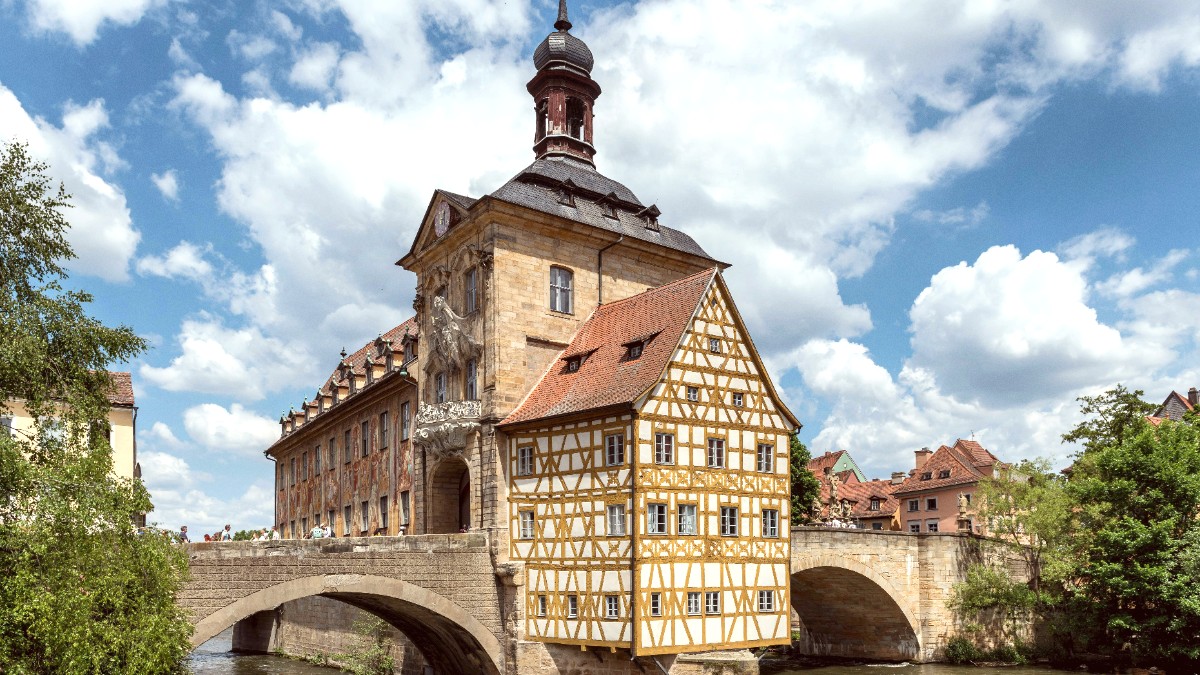
Bavaria, Germany
Spring (April-May): Temperatures typically range from 5°C (41°F) to 15°C (59°F). The weather is generally mild, with comfortable humidity. May often brings warmer, sunnier days. This period is pleasant for walking and exploring, with trees and flowers beginning to bloom.
Summer (June-August): Summer is the warmest season, with average temperatures from 15°C (59°F) to 25°C (77°F). Temperatures may occasionally exceed 30°C (86°F), notably in July and August. Precipitation is moderate and often occurs as short, intense thunderstorms.
High Season (June-August, and December for Christmas Markets): Warmest weather makes outdoor exploration enjoyable. Long daylight hours. December sees charming Christmas markets, creating a festive ambiance.
Shoulder Season (April-May, September-October): Weather is pleasant, ideal for walking. You encounter fewer crowds compared to high season, a more relaxed experience. Accommodation and flight prices are generally lower. This period holds beautiful natural scenery.
Summer / Dec
Larger crowds at popular attractions, especially during summer weekends.
Accommodation prices are at their highest; booking well in advance is advisable.
April-May / Sept-Oct
Fewer crowds compared to high season, for a more relaxed experience.
Prices are generally lower than in peak summer.
Jan-March / Nov
Fewest crowds, for intimate exploration of city history and culture.
Accommodation prices are at their lowest, for budget-friendly travel.
In summer, notably July and August, temperatures may rise above 30°C (86°F). Staying hydrated and seeking shade during the hottest parts of the day is important. Summer afternoons frequently bring short, intense thunderstorms.
Winter months, especially January and February, may bring heavy snowfall. This can make walking on cobblestone streets slippery. Appropriate, slip-resistant footwear is advisable.
Summer (June-August) for best weather, outdoor cafes, and major festivals like Sandkerwa.
Shoulder seasons (April-May, Sept-Oct) for pleasant weather, good light, and fewer crowds.
December for enchanting Christmas markets, festive atmosphere, and mulled wine.
Late spring to early autumn for comfortable sightseeing from the water.
Low season (Jan-March, Nov) for fewer crowds and lower accommodation prices.
Germany, as a member of the Schengen Area, has unified entry regulations for many nationalities.
Visa-free entry: Citizens of numerous countries, including the United States, Canada, Australia, New Zealand, the United Kingdom, and all Schengen Area member states, do not need a visa for tourist or business stays up to 90 days within any 180-day period.
Schengen Visa (Short-stay C-Visa): Citizens of countries without a visa-free agreement must obtain a Schengen visa. This visa allows stays up to 90 days within any 180-day period. Application: a completed form, a valid passport, passport-sized photos, a detailed travel itinerary, proof of accommodation, evidence of sufficient funds, and travel insurance. Apply for this visa at a German embassy or consulate in your home country.
No general entry fees for tourists entering Germany. Upon arrival at a German port of entry, proceed through passport control. Immigration officers verify your identity, passport, and visit purpose.
No special permits are generally needed for standard tourism activities. Check the official German Foreign Office website or your country's embassy travel advisories for current regulations.
Short Stays
Citizens of US, Canada, Australia, UK, and Schengen nations.
Limited to 90 days within any 180-day period.
Tourist / Business
Grants access to the Schengen Area for up to 90 days.
Requires a comprehensive application and travel insurance.
Extended Stays
Enables study, work, or long-term residence.
An extensive application process, varying by purpose.
Budget Traveler: €50-€80/day. This includes a hostel dorm or basic guesthouse (€25-€40), self-catering or street food (€15-€25), walking or a day ticket (€5-€7), and free attractions or occasional museum entry (€5-€10).
Mid-range Traveler: €100-€180/day. This covers a comfortable 3-star hotel (€70-€120), casual restaurants (€30-€50), public transport with occasional taxis (€10-€20), and several paid attractions (€15-€30). Luxury Traveler: €250+/day. For stays in 4-5 star hotels (€150+), fine dining (€60+), taxis/private transfers (€30+), and guided tours or premium experiences (€30+).
Hostel dorm: €25-€40. Budget hotel/guesthouse: €70-€100. Mid-range hotel: €120-€180. Luxury hotel: €200+
Coffee: €2.50-€4. Bakery item: €1.50-€3. Street food: €4-€7. Budget main course: €12-€20. Mid-range main course: €18-€30. Fine dining: €50+.
Single bus ticket: ~€2.80. Day ticket: ~€5.60. Taxi starting fare: ~€3.50-€4.50/km.
Museum entry: €5-€10. New Residence Imperial Apartments: €9-€10. River boat tour: €10-€15. Cathedral: Free main nave.
Around €4-€6 at local brewery inns.
Germany maintains high standards for public health and safety, though awareness of local conditions is always beneficial.
No specific vaccinations are for entry. Ensure routine vaccinations are current: Measles, Mumps, Rubella (MMR), Diphtheria, Tetanus, Pertussis (DTaP), Polio, and the annual Flu shot. Consult a healthcare professional before travel.
Seasonal Allergies: Pollen may be high in spring/summer; bring antihistamines. Cold/Flu: These are common, notably during winter months; practice hand hygiene to prevent spread.
Germany has an excellent, high-quality healthcare system. Tap water is safe. Food hygiene standards are very high.